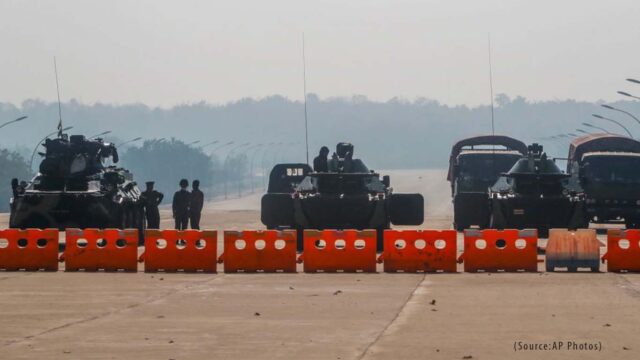In a recent development, Myanmar faced a military coup on 1 February 2021 and Aung San Suu Kyi, President Win Myint along with all the elected political leaders were detained. This comes after elections were held on 8th November 2020 which resulted in a landslide victory of the pro-democracy political party National League for democracy (NLD).
A look at the international response to this incident re-emphasises the value of democratic spirit. As per Gerard McCarthy, of the Singapore’s National University of Singapore, this action will result in an isolation of the country from the non-Chinese international partners, harm to the military’s commercial interests and will lead to resistance from people who voted in favour of Suu Kyi and the NLD.
American President Joe Biden threatened re-imposition of sanctions on Myanmar if the coup was not reversed. He suggested that this was an international challenge and needed a combined effort to ensure restoration of democracy in the country. The US sanctions had been eased by former US President Obama after the military started giving slack to its control over the state politics. The restrictions were completely lifted in 2016.
Australia being one of the consistent supporters of Myanmar’s armed forces over the years is under pressure to cut ties now. However the complete isolation of Myanmar does not seem as a feasible option to Australia keeping in mind the increasing role of China in the current dynamics. Australian Foreign Minister Marise Payne suggested that the military in Myanmar respect the rule of law and resolve issues through “lawful mechanisms”.
The Chinese media described the coup as a “major cabinet reshuffle” and vetoed the decision of a joint effort to condemn Myanmar’s coup with support from Russia. There is an opinion that this stand is in line with Chinese belief of non-interventionism.
UK Prime Minister Boris Johnson condemned the coup and urged that the people’s choice be respected. He denounced the unlawful imprisonment of “civilians including Aung San Suu Kyi”.
France and Germany strongly condemned the coup. The European Council President Charles Michel tweeted about his strong condemnation of the coup and stated that the outcome of the elections be respected and the democratic process be restored.
Indian Ministry of External Affairs issued a press statement stating its deep concern over the coup and said that the democratic process must be upheld.
The coup has been justified by the military and the supporters on the grounds of apparent fraud that was done during the November elections. However the sudden take over has hinted a disregard for electoral process and democratic spirit in the country. While US calls for an international response, there is some division in the intensity of the response of different countries. China and Russia have stayed away from supported an all out action.
While there is possibility of economic sanctions from the American sides, the Australian stand is not completely clear. The democracies over the world have reacted strongly to the development. But Indian stakes in Myanmar have direct consequences on the strategic balancing in South Asia vis-à-vis China. Hence, the Indian response is to be watched carefully despite the concern over the situation publicly made by the officials. The Rohingya crisis put Myanmar in lime light over humanitarian and human right concerns. This coup just adds to the apprehensions.









